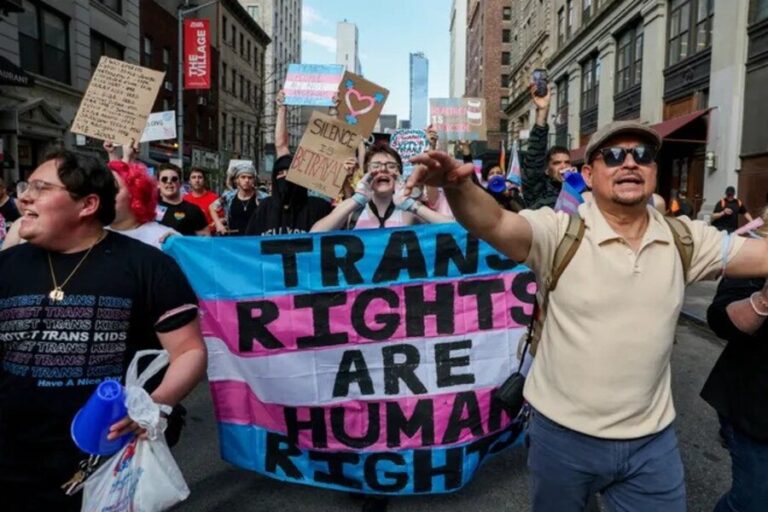In a landmark decision with far-reaching implications for LGBTQ+ rights, a federal judge has halted the Trump administration’s enforcement of a controversial passport policy that barred transgender and nonbinary Americans from obtaining passports reflecting their gender identity. The ruling, issued on June 17 by U.S. District Judge Julia Kobick in Boston, places a nationwide injunction on the policy, allowing trans and nonbinary individuals across the United States to once again receive travel documents that affirm their identity.
This judicial intervention comes in response to an executive order issued by former President Donald Trump upon his return to office, which mandated that all federal agencies recognize only two sexes—male and female—as immutable. Under this directive, the U.S. Department of State was instructed to issue passports exclusively based on a person’s sex assigned at birth, eliminating the previously available options for gender designation, including the nonbinary “X” marker. The administration’s justification for this policy framed biological sex as fixed, dismissing the existence and rights of transgender and nonbinary people.
Judge Kobick’s ruling extends a preliminary injunction she had issued in April, which applied to just six plaintiffs. At that time, she ordered the State Department to process those individuals’ passport applications with gender markers matching their identities. However, the June ruling broadens the scope, effectively blocking the policy’s implementation for all affected individuals in the United States.
The consequences of the now-halted policy were immediate and deeply felt. Trans and nonbinary Americans who had applied for or attempted to renew passports were met with confusion, rejection, and in some cases, punitive scrutiny. Travelers with documents that did not match their gender presentation were flagged, detained, and accused of carrying fraudulent identification. Others were left in bureaucratic limbo, with their applications stalled or indefinitely delayed due to internal enforcement of the executive order.
In her written opinion, Judge Kobick found that the Trump administration’s passport policy likely violated the Fifth Amendment, which guarantees equal protection and due process. “Preventing individuals from obtaining passports that reflect their lived gender identity inflicts concrete harm and is unlikely to withstand constitutional scrutiny,” she wrote.
The ruling is not only a significant win for the plaintiffs but also a broader repudiation of federal policies aimed at rolling back LGBTQ+ rights. During Trump’s tenure, the administration implemented a series of measures that reversed protections for transgender individuals across health care, education, and military service. Among the most high-profile of these actions was the ban on transgender individuals serving openly in the U.S. military—a policy the Supreme Court allowed to stand in May.
Civil rights advocates have hailed the injunction as a victory for dignity, equality, and the legal affirmation of gender identity. For many transgender and nonbinary individuals, having access to accurate identification documents is not a matter of preference—it’s a fundamental necessity. Mismatched IDs can lead to social stigma, denial of services, and even violence. A passport that aligns with one’s identity can be crucial not only for international travel but also for legal processes, employment, and basic civic engagement.
Though the current ruling is a preliminary injunction, it provides immediate relief to those affected while the broader case proceeds through the courts. Legal experts suggest that this case could set a significant precedent for future challenges to anti-transgender policies. It also underscores the judiciary’s role in checking executive actions that potentially infringe upon constitutional rights.
Looking ahead, the Biden administration or any subsequent presidency that supports LGBTQ+ rights could formally reverse the Trump-era executive order. However, the existence of such an order underscores the vulnerability of trans and nonbinary rights to changes in political leadership. Without codified legislative protections at the federal level, such issues remain subject to reversal through executive fiat.
This case also reinforces the importance of clear, consistent recognition of gender identity in federal policy. While some states and agencies have embraced inclusive identification practices, such as offering the “X” gender marker or streamlining the gender change process, others remain restrictive or ambiguous. National-level inconsistencies have left many Americans unsure of their rights and subject to arbitrary enforcement.
For now, Judge Kobick’s ruling ensures that transgender and nonbinary individuals can once again access one of the most vital forms of government-issued identification—a passport that affirms who they are. The ruling restores not just a legal right but a form of recognition and respect that had been stripped away under the previous policy.
As the case continues, its outcome may shape the legal landscape for years to come. At stake is not only access to documentation but also a fundamental question of whether the federal government will acknowledge the identities and lived realities of all its citizens, regardless of gender. In blocking the Trump administration’s passport policy, the court has taken a definitive step toward affirming that identity matters—and that it is worthy of protection under the law.
